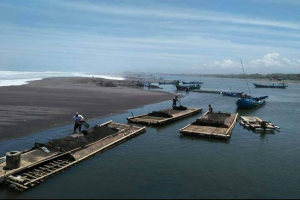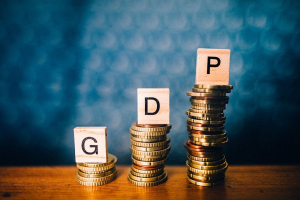Sea sand exports harm ecosystems, endanger the environment: Experts
The reopening of the sea sand export tap has stirred controversy in the society along with the issuance of Government Regulation (PP) No. 26/2023 on the Management of Sea Sedimentation.
The issue immediately drew widespread public attention because it would mean resuming sea sand exports after a 20-year moratorium. The government said that the purpose of managing sea sand was for the sake of industrial growth.
According to PP No. 26/2023, the management of sea sedimentation results is to prevent sedimentation from lowering the carrying capacity, the capacity of marine and coastal ecosystems, and the health of the marine environment. The PP is also responsible for optimizing sea sedimentation outcomes to support growth and restoration of marine and coastal ecosystems.
President Joko “Jokowi” Widodo has emphasized that the government will not export sea sand, but sea sedimentation that disrupts shipping routes. He maintained that sea sediment is different from sea sand although both have similar forms.
"I would like to emphasize once again that what is being opened is not the export of sea sand, but sea sediment. This sediment is what disrupts shipping routes," the president said as quoted by Antara on September 17, 2024.
There are several implementing regulations for PP No. 26/2023, namely Marine Affairs and Fisheries Ministerial Decree No. 6/2024 on the Reference Price of Sea Sand in regards with Non-tax State Revenue (PNBP) and Marine Affairs and Fisheries Ministerial Decree No16/2024 which stipulates seven coastal areas eligible for sea sand dredging with a total volume of 17.7 billion cubic meters and a total area of 5.9 cubic meters or around 589 thousand hectares.
The potential volume of marine sedimentation in the Java Sea is 5.58 billion cubic meters. Meanwhile, the Makassar Strait has 2.97 billion cubic meters and the Natuna-North Natuna Sea has 9.09 billion cubic meters.
Areas available for exploitation are dispersed throughout the Java Sea, specifically in regencies of Demak, Cirebon, Indramayu, and Karawang, as well as Surabaya City. Additional locations include the waters around the Riau Islands' Karimun Island, Lingga Island, and Bintan Island, as well as the waters surrounding Kutai Kartanegara Regency and Balikpapan City in East Kalimantan.
Meanwhile, Marine Affairs and Fisheries Ministerial Decree No. 47/2024 regulates among others on close observation for the use of the sea sedimentation. It also requires dredging vessels to report their transmission line in order for the ministry’s command center to track their movements and keep an eye on the amount of sediment they carry.
The ministry has named 66 companies eligible to manage the sea sedimentation outcomes. It is expected that through strict selection, the utilization of this sea sedimentation will not only increase exports, but also manage marine natural resources sustainably.
The Center of Economic and Law Studies (CELIOS), however, warns that PP No. 26/2023 has the potential to harm marine ecosystems and degrade living conditions of coastal communities.
Bhima Yudhistira, Executive Director of CELIOS, claims that dredging of sea sedimentation may cause harms to coral reefs, increase the rate of coastal erosion, and eradicate marine species. Since fishing is the source of many fishermen's livelihoods, it is also anticipated that the harm done to the ecosystem will directly affect fisherman.
"Sea sand exports not only impact the environment, but also threaten the survival of fishermen and coastal communities," Bhima spoke to Indonesia Business Post on October 3, 2024. He cautioned that the degradation of marine habitats will diminish catches, therefore impacting the economy of fishermen.
He asked the government to reconsider this policy, considering the long-term risks it could pose to both the environment and the socio-economy of coastal communities.
Andang Bachtiar, a mining expert from the Bandung Institute of Technology (ITB), said sea sand which is available in shallow waters of the Sunda Shelf, such as in the waters of Riau, Natuna, and northern Java, is a geological relic of the past.
“Some 20,000 to 10,000 years ago, ancient rivers ran across the Sunda Shelf, forming the sand that we see today. This old sand is better suited for coastal reclamation than the mud, clay, or silt that rivers currently carry,” Andang spoke to the Post on October 2, 2024.
“The mining of prehistoric sand in shallow water has nothing to do with the silting of rivers today. This type of sand, which contains undiscovered geological riches, like rare earth elements and placer gold, is the product of previous sedimentation,” he said.
Kompas news archives reveal that sea sand from the waters of Batam and Karimun islands in Riau Islands Province had been dredged for reclamation projects in Singapore since 1976. A February 16, 2003 article of Kompas daily reported that the volume of sea sand exported to Singapore was at approximately 250 million cubic meters per year.
Meanwhile, the volume of sea sand exported from Karimun in 2002 was at 36 million cubic meters per year. However, provincial income from mining activities was only Rp50 billion that year.
During those years, some 300 million cubic meters of sea sand were illegally exported every year, causing Rp 2.7 trillion in State losses annually.
In fact, sea sand has been exported to Singapore for a very long period. Singapore's land area has risen by 25 percent, from 580 square kilometers in 1960 to 660 square kilometers in 1999, largely due to the importation of sea sand from Indonesia.
Sea sand dredging has led to abrasion along the shore of the Riau Islands, which is one of the locations for sea sand mining. It also led to a decrease in fishermen’s catches.
Coastal and Marine Campaigner of the Indonesian Environmental Forum (Walhi), Parid Ridwanuddin, said that the country that benefits the most from Indonesian sea sand exports is Singapore.
“Singapore was very dependent on sand imports from Indonesia for reclamation and territorial enlargement purposes. They turned to Cambodia when Indonesia imposed a moratorium on sand exports,” he said.
"If we reopen the sea sand export, it is clear where the sand will go," he added.
According to Reuters, the Maritime and Port Authority of Singapore is designing the third phase of the Tuas Port mega project, which includes reclamation project that is expected to be completed in mid-2030s. This project is reportedly the reason why Singapore is in dire need of sand supply from Indonesia.
Indonesia's previous ban on sea sand exports has stirred tensions with Singapore. In 2007, Singapore accused the Indonesian government of using the export ban as a pressure tool in negotiations on extradition treaty and border delimitation. The extradition treaty was eventually signed in January 2022.
In addition to Singapore, China is also said to potentially benefit from the lifting of the ban on sea sand exports.
International law professor at the University of Indonesia, Hikmahanto Juwana, says that Singapore's massive land reclamation projects would have no impact on its sea boundaries under international law.
“Based on the United Nations Convention on the Law of the Sea (UNCLOS), artificial islands such as those resulting from reclamation projects cannot be used as a basis for increasing territorial sea boundaries,” Hikmahanto told the Post on October 11, 2024.
"Artificial islands do not have the same status as natural islands and cannot expand a country's sea boundaries. Therefore, Singapore's reclamation project does not change the internationally recognized territorial sea boundaries," he added.
On the contrary, the reclamation project has the potential to reduce Singapore's territorial waters.
“Reclamation changes the natural coastline, and in accordance with UNCLOS principles, the measurement of territorial sea boundaries is based on the country's natural coastline. Thus, territorial land enlargement does not expand, but on the contrary reduces their territorial waters,” Hikmahanto concluded.
Tag
Already have an account? Sign In
-
Start reading
Freemium
-
Monthly Subscription
20% OFF$29.75
$37.19/MonthCancel anytime
This offer is open to all new subscribers!
Subscribe now -
Yearly Subscription
33% OFF$228.13
$340.5/YearCancel anytime
This offer is open to all new subscribers!
Subscribe now







